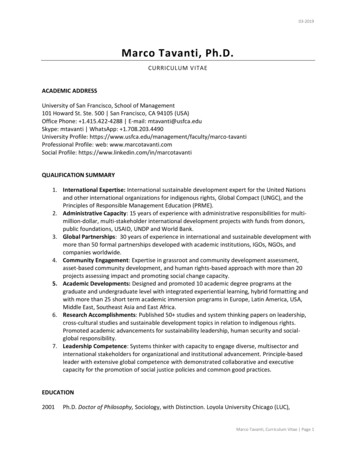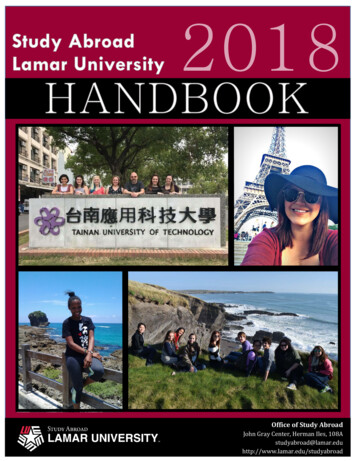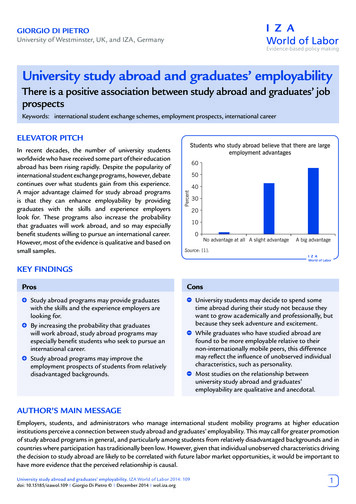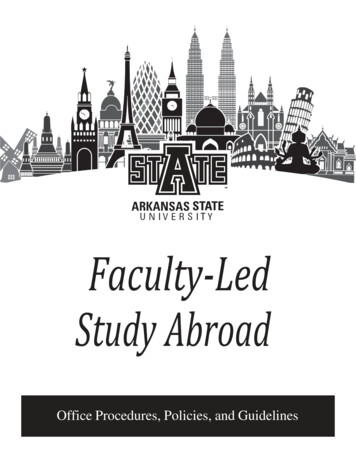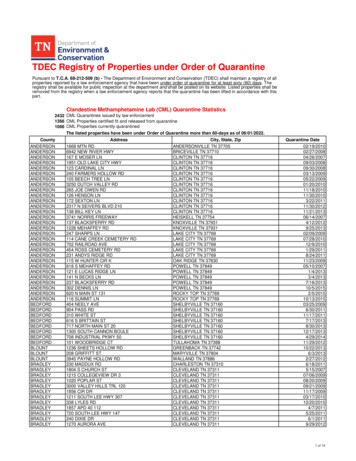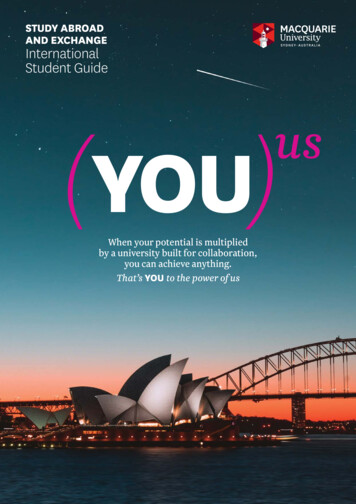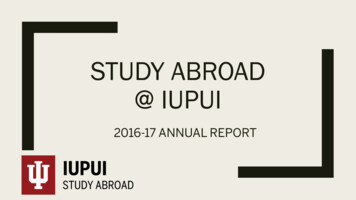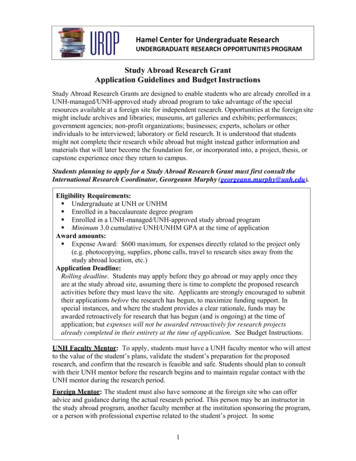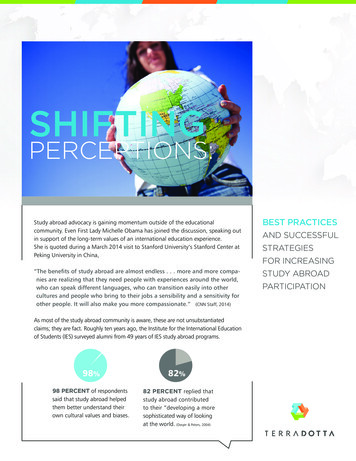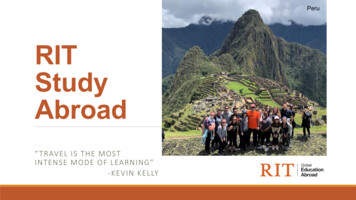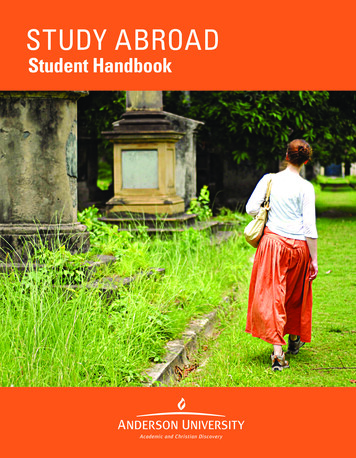
Transcription
STUDY ABROADStudent Handbook
ANDERSON UNIVERSITY STUDY ABROAD HANDBOOKCONTENTSI. STUDY ABROAD with A.U. REGISTRATIONCheck List for Study Abroad – A.U. Registration3Registration Form5Financial Assistance for Study Abroad6Financial Assistance Form7II. STUDY ABROAD, NON-A.U. REGISTRATION with TRANSFER CREDITCheck List for Non-A.U. Registration with Transfer Credit8General Information for Transfer Credit9Transfer Credit Registration Form10III. RESOURCES for STUDY ABROADResource List of Endorsed Programs11Passport and Visa Information12Safety and Health While Abroad13Study Abroad Resources16Emergency Management Policy17Insurance and Contact Form19Agreement and Release Form20Evaluation Form222
CHECK LISTSTUDY ABROAD and USA OFF-CAMPUS STUDYAnderson University RegistrationImportant Dates to RememberFor study during Semester II:Applications for financial aid must be submitted by the second Friday in November.Registration must be completed by the first Friday in December.For study during Semester I or Summer term:Applications for financial aid must be submitted by the last Friday in March.Registration must be completed by the third Friday in April.1. Meet with the Director of Tri-S and Study Abroad regarding generalpolicy and procedures for study abroad or USA off-campus study.A faculty liaison will oversee your study experience. This person may be your advisor, a faculty member, adepartment chair or the Director of Tri-S and Study Abroad. The faculty liaison person will review thecourse content of your proposed study and assist you in the application and registration process.2. Meet with your academic advisor and/or faculty liaison, select a study program, and obtain acourse description, application, schedule of classes, cost information, etc.All study programs and specific courses must be pre-approved by Anderson University. See A.U.endorsed study programs.3. Apply for a passport. (If required, apply for a visa.) Review safety and security issues related tothe country and city where you intend to study. Review vaccination requirements, health insurancecoverage and general health issues.The Study Abroad Office can provide information regarding passports, safety and security issues,supplemental health insurance, International Student Identity Card, and study abroad orientation.4. In consultation with your faculty liaison, complete the A.U. registration form. Obtain the signaturesof the faculty liaison and/or department chair.The department chair must approve courses that apply to your major/minor. The registrar mustapprove courses that apply to your liberal arts requirements. The faculty liaison, in conjunction withthe registrar, will assign appropriate course numbers for A.U. registration.5. If you are eligible for Anderson University financial aid for study abroad or USA off-campus study,complete the Application for Anderson University Financial Assistance and submit it to the CIIS.While institutional financial aid for on-campus study does not automatically transfer to off-campusstudy programs, you may be eligible for a study abroad grant from Anderson University. Forinformation, see Financial Aid.6. Meet with your Student Financial Services advisor. Provide Student Financial Services with costinformation for your study program and be sure that all financial aid forms are completed and signed. Onceyou have completed payment arrangements, obtain a signature from Student Financial Services on theregistration form.3
Upon acceptance by the school where you intend to study, you will continue to make payment to AndersonUniversity. Anderson University will then make payment to the study abroad program. There is an A.U.administrative fee of 350.00 payable at this time.7. Read and sign the Anderson University Agreement and Release form. Complete Health Insuranceand Contact Information form. Submit these forms to the Study Abroad Office.8. Submit the registration form to the Office of the Registrar. This will complete your AndersonUniversity registration for study abroad or USA off-campus study.PLEASE NOTE THE FOLLOWING: You are required to attend all orientation sessions for study abroad. After you have completed your study, it is your responsibility to request that a transcript be sent to AndersonUniversity. The faculty liaison person will review the transcript and submit your grade to the Registrar’s Office. Upon returning to Anderson University, schedule an appointment with the Director of Tri-S and Study Abroad.Complete and return the Study Abroad Evaluation form to the Study Abroad Office.4
Anderson UniversitySTUDY ABROAD/OFF CAMPUS Registration FormCourses with A.U. RegistrationRegistration for Semester II must be completed by the first Friday in December.Registration for Semester I or Summer must be completed by the third Friday in April.Check one:Study Abroad (not U.S.)Off Campus Study (U.S.)NAMELastFirstMiddleStudent IDCatalog (circle): 2014-152012-142010-12Other:Primary Major Advisor**Schedule of Classes for (circle):Fall Sem ISpring Sem IISummer20 -Name of School or Program of StudyLocation (City/Country)DeptCourseSectHrsTitleCall #GradeStudent Signature DateApproval:Study Abroad Advisor(s)DateDepartment ChairDateDirector of Student Financial ServicesDateDirector of Tri-S and Study AbroadDateUniversity RegistrarDate**Student Schedule of Classes (yellow, triplicate form) signed by Advisor must accompany this form.COPY: Study Abroad Advisor(s), Dean of College, Director of Student Financial Services, StudentRev 08/20085
FINANCIAL ASSISTANCE FOR STUDY ABROADGovernment AssistanceMost forms of federal and state financial assistance will be available to you for study abroad. Consult with the Office ofStudent Financial Services for eligibility and use of these funds for your study abroad program. Federal Pell Grant is awarded to exceptionally needy undergraduate students. Part-time enrollment reduceseligibility. Federal Supplemental Educational Grant (SEOG) is awarded to exceptionally needy undergraduate students.Must be enrolled at least half-time. Benjamin A. Gilman Scholarship Program is sponsored by the Bureau of Educational and Cultural Affairs at theU.S. Department of State and is administered by the Institute of International Education (IIE). This scholarshipprogram is only open to undergraduate Federal Pell Grant recipients who intend to study abroad for a semester,summer or year-long program. The National Security Education Program (NSEP) and the Fulbright Program funded by the Federal governmenthave grants and fellowships for undergraduate and graduate students for study and research overseas. Studentsshould be aware that government organizations in other countries such as the German Academic ExchangeService (DAAD) offer funding opportunities. Foreign Language & Area Studies (FLAS) Fellowship program funded by the U.S. Department of Educationprovides study abroad funding to undergraduate and graduate students who are pursuing foreign language andarea studies. The Critical Language Scholarship Program, a program of the U.S. Department of State, Bureau ofEducational and Cultural Affairs, funds intensive summer language institutes in thirteen critical foreign languages.Other Sources of Financial Assistance Matching fund programs (church, etc.)Scholarships and grants (non-Anderson University)- Review scholarship and financial aid available from the school where you intend to study.- Research scholarship and grant options on the internet:o STA Travelwww.statravel.com/scholarships.htmSTA Travel awards two 2,500 scholarships a year for students for a study abroad program.o Abroad Planet Scholarship Online community of international students studying in the United States.o College Free online financial aid source for scholarships, grants, and loans for all college-bound students,including permanent residents and international students wishing to study in the United States.o FastWebhttps://www.fastweb.com/registration/step 1/Free customized list of financial aid sources, including private sector scholarships, fellowships, grants,and loans.o International Education Financial Aidwww.iefa.org/Free online scholarship search service designed for international students.o International Scholarshipswww.internationalscholarships.com/Free online scholarship database for international students wishing to study worldwide.o Mobility International USAwww.miusa.org/resource/tipsheet/fundingtousFree online scholarship resource for non–U.S. citizens with disabilities.6
ooooooooUnited Nations Educational, Scientific and Cultural Organization tworking/fellowship.shtmlFree online searchable database for scholarships to international students.The Financial Aid Pagewww.finaid.org/Free online scholarship searches and comprehensive listing of financial aid information.The Student gisFree resource published annually by the U.S. Department of Education.The College p-searchScholarship search and grant informationP.L.A.T.O.www.plato.org/Scholarship search and grant olarships.aspxInformation on scholarships and grants for study hipsearch/Free searchable database of scholarships and fellowships.Study Abroad Fundingwww.studyabroadfunding.orgStudy abroad scholarship search engine maintained by the Institute of International Education.Anderson University AssistanceAnderson University financial aid for on-campus study does not transfer to study abroad or off-campus (USA) studyprograms. However, students may be eligible for a study abroad grant from Anderson University. Generally, federal andstate financial aid would be available to study abroad.To apply for Anderson University assistance, complete the Application for AU Financial Assistance for Study Abroad andsubmit it to the Center for International and Intercultural Studies. Anderson University funds are available for a maximumof one semester overseas study during the student’s enrollment at Anderson University. Financial assistance is notavailable for short-term internships or summer study programs. The maximum award is 3,000.00. Students attendingAnderson University by virtue of tuition exchange or remitted tuition programs may be eligible depending on theavailability of funds. The funds are allocated on the basis of the following: Priority is given to students whose degree program requires international studyAwards are based on financial need, taking into consideration the student’s eligibility for non-Anderson Universityfinancial assistance (Federal, State, etc.)Student has demonstrated academic qualifications for study abroadProgram of study is approved by the Department Chair in conjunction with the Director of Tri-S and Study AbroadStudent has been enrolled as a full time student at Anderson University the semester prior to proposed overseasstudy.Student is enrolled full time in a degree program at Anderson University at the time of overseas studyProposed study abroad is relevant to the student’s degree programANDERSON UNIVERSITYApplication for Financial Assistance for Study Abroad7
It is important to apply early. Applications are processed as they are received.Instructions: Application for Semester II Study Abroad must be received by the second Friday in November. Application for Semester I Study Abroad must be received by the last Friday in March. Attach copy of Study Abroad Registration Form Submit completed form to the Center for International and Intercultural StudiesStudent NameStudent Identification Number MajorCredit Hours Completed Does your major require study abroad? yes noWere you a full time student at AU last Semester? yes noHave you previously studied abroad as an A.U. student? yes no When?AdvisorFaculty Liaison PersonStudy Abroad ProgramLocation of Study AbroadDate of Study AbroadProgram is sponsored, conducted or endorsed by the following U. S. entityHave you already been accepted? Yes NoIf no, have you already applied? Yes No Date of ApplicationAnticipated Cost of Study Abroad (tuition, lodging, meals & transportation)Signature DateCHECK LISTSTUDY ABROAD and USA OFF-CAMPUS STUDYNon-AU Registration / Transfer CreditImportant Dates to Remember8
For study during Semester II:Applications for financial aid must be submitted by the second Friday in November.Registration must be completed by the first Friday in December.For study during Semester I or Summer term:Applications for financial aid must be submitted by the last Friday in March.Registration must be completed by the third Friday in April.1. Meet with the Director of the Center for International and Intercultural Studies regarding generalpolicy and procedure for study abroad or USA off-campus study.A faculty liaison will oversee your study experience. This person may be your advisor, a faculty member, adepartment chair or the Director of the CIIS. The faculty liaison person will review the course content of yourproposed study and assist you in the application and registration process.2. Meet with your academic advisor and/or faculty liaison, select a study program, and obtain a coursedescription, application, schedule of classes, cost information, etc.All study programs and specific courses must be pre-approved by Anderson University. See EndorsedStudy Programs.3. Apply for a passport. (If required, apply for a visa.) Review safety and security issues related to thecountry and city where you intend to study. Review vaccination requirements, health insurance coverageand general health issues.The CIIS can provide information regarding passports, safety and security issues, supplemental healthinsurance, International Student Identity Card, and study abroad orientation.4. In consultation with your faculty liaison, complete the Study Abroad Transfer Courses form. Obtainthe necessary signatures of advisor, department chair, etc. (Be sure to attach copies of course descriptionsto the form.)The department chair must approve courses that apply to your major/minor. The registrar must approvecourses that apply to your liberal arts requirements.5. Read and sign the Anderson University Agreement and Release form. Complete Insurance andContact information form. Submit these forms to the CIIS. Obtain the signature of the Director of the CIIS onStudy Abroad Transfer Courses form.6. Submit the Study Abroad Transfer Courses form to the Office of the Registrar. This will completethe documentation of your study with transfer of credit.PLEASE NOTE THE FOLLOWING: You are required to attend all orientation sessions for study abroad. After you have completed your study abroad, it is your responsibility to request that a transcript be sent to AndersonUniversity. The faculty liaison person will review the transcript and submit your grade to the Registrar’s Office. Arecord of your course work and the name of the institution where you studied will appear on your AU transcript. Upon returning to Anderson University, schedule an appointment with the Director of Tri-S and Study Abroad.Complete and return the Study Abroad Evaluation form to the CIIS.GENERAL INFORMATION for TRANSFER COURSES9
Not all study abroad or USA off-campus study programs will be approved for transfer backto Anderson University. For more information, contact the Registrar’s Office.1. To obtain permission to take a course abroad and have it transfer to Anderson University, the course needs to be taken at acollege or university, or other program of study recognized by Anderson University.2. Do you plan to use the course in the liberal arts, major, minor or elective areas?If you plan to use the course in your major or minor, you must secure approval for each course from the department chair.If you plan to use the course in the liberal arts, you must secure approval for each course from the Office of the Registrar.4. Repetition of a course - If you received a grade of 'D' in a course at A.U., you may not repeat it at another school. If youreceived a grade of 'F' in a course, then you may elect to repeat it at another school, however, it will not replace the grade atA.U. or factor into your GPA.5. A final grade of "C minus" or above must be earned. No grades will be recorded for transfer credit since your semester an d/orcumulative grade point average (GPA) is figured on Anderson University work only.6. Residence Requirements - to earn a degree from Anderson University a student must be in residence at the universityfor the last 24 hours applicable to the degree. Under some circumstances, and with special permission, a maximum of 6of the final 24 hours may be taken elsewhere.If this applies to you, then write your request on a full sheet of paper giving your reasons for wanting to take thecourses out of residence. The Registrar will act upon this petition.7. Graduation requirement: Transfer credits from other institutions must be in the Office of the Registrar by April 1 of theyear in which the student expects to graduate.8. When final grades have been recorded, request the Office of the Registrar at the school where you took the course(s) to sendan official transcript to: Office of the Registrar, Anderson University, 1100 E 5th Street, Anderson, IN 46012-3495.THE INSTITUTION ATTENDED MUST SEND AN OFFICIAL TRANSCRIPT BY MAIL TOANDERSON UNIVERSITY. TRANSCRIPTS WILL NOT BE ACCEPTED HAND DELIVERED.10
STUDY ABROAD TRANSFER CoursesNon-AU RegistrationNAME(last)(first)(middle)ID #Catalog:2014-15 2012-14 2010-12 2008-10other:Primary MajorAdvisor2nd Major / MinorAdvisorTerm of Study (circle): Fall Sem I / Spring Sem II / Summer20-Name of School orProgram of nCity/CountryqqqqqqqqqqqqqqqqqqqqqqqqqqqqqqAU EquivalentCaption & CourseApproval(Initial)I have read the reverse side and understand the requirements I must meet in order for this credit to transfer to Anderson University.Student SignatureDateApproval:Director of the Center for International and Intercultural StudiesDateStudy Abroad Advisor(s)DateUniversity RegistrarDateCOPY:Director of theInternationalCIIS, StudyEducation,Abroad Advisor(s),Study AbroadDeanAdvisor(s),of College,DeanStudentof College, StudentRev 09.200711
RESOURCE LIST OF ENDORSED PROGRAMSStudy programs listed below are endorsed by A.U. for study and transfer of credit to Anderson University.Final approval of a specific program must be given by the Department Chair, the Registrar, and theDirector of Tri-S and Study Abroad.American Institute for Foreign Study (AIFS)Arcadia Study AbroadAu Sable Institute of Environmental StudiesBCA Study AbroadButler University, The Institute for Study AbroadCCCU, Best SemesterCentral College AbroadCollege Consortium for International Studies (CCIS)Council on International Education Exchange Consortium (CIEE)Institute for European Studies (IES)International Studies Abroad (ISA)Jerusalem University CollegeLCC International University (formerly Lithuania Christian College)Semester in Spain, Trinity Christian CollegeStudio Art Centers International (SACI)12
PASSPORT and VISA INFORMATIONA PASSPORT is an internationally recognized identification document issued by our government tocitizens or nationals of the United States. It is your best form of identification and is needed to departor enter the United States and to enter and depart foreign countries. A passport is required forinternational travel and is valid for ten years. It is important to apply very early for passports.Although you may receive your passport sooner, you should allow at least six weeks for it toarrive; sometimes, there can be lengthy delays.If you currently have a passport, check NOW to be sure it will be valid on your dates of travel. Note that some countrieswill not permit you to enter if the remaining passport validity is less than six months.A VISA permits you to visit a country for a specified purpose and a limited time. A visa is stamped into your passport andmay take from two weeks to two months for issue. Visas are usually not required for travel to parts of Europe, theCaribbean and most of Central and South America. If you will be studying abroad, contact the advisor of the school youwill be attending for information about securing a student visa.PHOTOGRAPHS required for passports must meet rigid standards of size and quality. You may have your photo taken atthe Raible Avenue Post Office when you apply for your passport. CVS, Walgreen’s, and other places also take passportphotos.A BIRTH CERTIFICATE bearing the original seal and/or signature must be presented to secure a passport. If your originalbirth certificate is lost, you may request a certified copy from the Official Bureau of Vital Statistics in the state where youwere born. Charges vary from 2 to 18. To order online, see www.vitalchek.com. A hospital certificate or a quick copythat you have made of the birth certificate is NOT acceptable.The PASSPORT FEE is currently 135, payable at the time application (form DS-11) is made at the post office (seebelow). Passport renewals (form DS-82) may be done by mail at a cost of 110.APPLICATION PROCEDURE:1. Print the application form from the U.S. Department of State website, www.travel.state.gov. Complete the passportapplication but do not sign it, except in the presence of the clerk at the post office.2. Have passport photos taken at the post office (or CVS, Walgreen’s, etc.) Do not sign photos.3. Secure original or certified copy of your birth certificate as proof of United States citizenship.4. Take completed application (unsigned), two passport photos (unsigned), birth certificate, valid driver’s license andpersonal check or cash for the 135 fee to a government agency authorized to accept passport applications. No creditcards are accepted. If you are paying by check, you will need two checks (there is a passport fee and a separate postoffice fee).In Anderson, the Post Office at 1505 Raible Ave. is authorized to accept applications. To get to the Post Office, take 8th St. westthrough town until you come to the traffic light at Raible Ave. (by the duck pond and bridge). Turn left (south) and continue on past theNichol Ave. intersection. The Post Office will be just past the intersection on your right. They will accept applications until 4 p.m.Monday-Friday. Your passport and birth certificate will be mailed to you at the "mailing address" you enter on the application form.If you are applying in a city other than Anderson, call the local post office to inquire as to where passport applications are accepted.There is generally one designated passport acceptance facility in a city or county, depending on the population size. You may also goonline to the website below to find passport facilities. The cost will be the same wherever you apply.For detailed passport/visa information,visit the website of the U.S. Department of State, www.travel.state.gov.13
SAFETY AND HEALTHGENERAL INFORMATIONThe safety and health of participants in study abroad is of primary concern to Anderson University. Participants need to beaware that there is additional safety and health risk related to living in another country. However, there are precautions that youcan take to significantly reduce the risk. This document summarizes some basic guidelines and procedures for a safe studyabroad.Study abroad participants should: Read and carefully consider all materials issued by the study abroad program that relate to safety, health,legal, environmental, political, cultural, and religious conditions in host countries. Consider their health and other personal circumstances when applying for or accepting a place in a program. Make available to the sponsor accurate and complete physical and mental health information and any otherpersonal data that is necessary in planning for a safe and healthy study abroad experience. Assume responsibility for all the elements necessary for their personal preparation for the program andparticipate fully in orientations. Obtain and maintain appropriate insurance coverage and abide by any conditions imposed by the carriers. Inform parents/guardians/families, and any others who may need to know about their participation in the studyabroad program, provide them with emergency contact information, and keep them informed on an ongoingbasis. Understand and comply with the terms of participation, codes of conduct, and emergency procedures of theprogram, and obey host-country laws. Be aware of local conditions and customs that may present health or safety risks when making daily choicesand decisions. Promptly express any health or safety concerns to the program staff or other appropriateindividuals. Behave in a manner that is respectful of the rights and well-being of others, and encourage others to behavein a similar manner. Become familiar with the procedures for obtaining emergency health and law enforcement services in the hostcountry. Follow the program policies for keeping program staff informed of their whereabouts and well-being.Before You GoSafety begins when you pack. To avoid being a target, dress conservatively. As much as possible, avoid the appearanceof affluence.Always try to travel light: you can move more quickly and will be more likely to have a free hand. You will also be less tiredand less likely to set your luggage down, leaving it unattended.Carry the minimum amount of valuables necessary for your trip and plan a place or places to conceal them. Yourpassport, cash and credit cards are most secure when locked in a hotel safe. When you have to carry them on yourperson, you may wish to conceal them in several places rather than putting them all in one wallet or pouch. Avoidhandbags, fanny packs and outside pockets that are easy targets for thieves. Inside pockets and a sturdy shoulder bag14
with the strap worn across your chest are somewhat safer. One of the safest places to carry valuables is in a pouch ormoney belt worn under your clothing.If you wear glasses, pack an extra pair. Bring them and any medicines you need in your carry-on luggage.Pack an extra set of passport photos along with a photocopy of your passport information page to make replacement ofyour passport easier in the event it is lost or stolen.Put your name, address and telephone numbers inside and outside of each piece of luggage. Use covered luggage tagsto avoid casual observation of your identity or nationality.Consider getting a telephone calling card. It is a convenient way of keeping in touch. If you have one, verify that you canuse it from your overseas location(s). Find out your access number before you go.Don't bring anything you would hate to lose. Leave at home valuable or expensive-looking jewelry, irreplaceable familyobjects, and all unnecessary credit cards.Leave a copy of your itinerary with family or friends at home in case they need to contact you in an emergency.Make two photocopies of your passport identification page, airline tickets, driver’s license and the credit cards that youplan to bring with you. Leave one photocopy of this data with family or friends at home; pack the other in a place separatefrom where you carry your valuables.Documentation for MedicationsIf you go abroad with preexisting medical problems, you should carry a letter from your doctor describing your condition,including information on any prescription medicines that you must take. You should also have the generic names of thedrugs. Leave medicines in their original, labeled containers. These precautions make customs processing easier. Adoctor’s certificate, however, may not suffice as authorization to transport all prescription drugs to all foreign countries. Toensure that you do not violate the drug laws of the countries that you visit, you may consult the embassy or consulate ofthose countries for precise information before you leave the United States.If you have allergies, reactions to certain medicines, or other unique medical problems, you may consider wearing amedical alert bracelet or carrying a similar warning.ImmunizationsAt least four months prior to your travel, consult with your physician regarding immunizations and general healthprecautions. Be sure that you are up to date on basic childhood immunizations (tetanus, polio, diphtheria, etc.). If you willbe traveling to a developing country, then typhoid fever, hepatitis A and B, cholera and yellow fever are frequentlyrecommended immunizations. Also, anti-malarial medicine may be recommended if traveling to malarial areas.Some countries require specific immunizations for entry, while others do not. These requirements can change accordingto the health conditions within the country. You will want to monitor the immunization and vaccination requirements of thecountry. Even if some immunizations are not required for entry, you still may want to get them. Be sure to discuss thiswith your doctor.You may be required to present an official record of immunizations upon entry to a country. An "International Certificate ofVaccinations" is the most common form used. It is issued by the U.S. Department of Health and Human Services and isapproved by the World Health Organization. You can get the form from your local Department of Health, travel clinic,passport offices and from many physicians.Health and Accident InsuranceCheck to see if your health insurance covers you abroad. Even if your health insu
Anderson University STUDY ABROAD/OFF CAMPUS Registration Form Courses with A.U. Registration Registration for Semester II must be completed by the first Friday in December. Registration for Semester I or Summer must be completed by the third Friday in April. Check one: _ Study Abroad (not U.S.) _ Off Campus Study (U.S.) .

